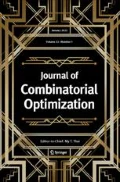Abstract
This paper considers a two-stage medical supply chain scheduling problem from the perspective of the medicine manufacturer in which jobs have an assignable common due window and shelf life. Each job will incur an early (tardy) penalty if it is early (tardy) with respect to the common due window under a given schedule. The job’s holding time, which is the time interval that passes from the completion time of the job to the delivery date of the job in the batch, must be no more than its shelf life. The objective is to minimize the total cost comprising earliness, weighted number of tardy jobs, holding time, due window starting time, window size, and batch delivery. We first show that the problem is NP-hard and then provide a pseudo-polynomial-time algorithm. We also prove that a special case of the problem can be optimally solved in polynomial time.
Similar content being viewed by others
References
Assarzadegan P, Rasti-Barzoki M (2016) Minimizing sum of the due date assignment costs, maximum tardiness and distribution costs in a supply chain scheduling problem. Appl Soft Comput 47:343–356
Bilgen B, Çelebi Y (2013) Integrated production scheduling and distribution planning in dairy supply chain by hybrid modelling. Ann Oper Res 211:55–82
Chen Z (1996) Scheduling and common due date assignment with earliness-tardiness penalties and batch delivery costs. Eur J Oper Res 93:49–60
Cheng T (1988) Optimal common due-date with limited completion time deviation. Comput Oper Res 15:91–96
Entrup M, Grunow M, Günther H, Beek T (2005) An milp modelling approach for shelf life integrated planning in yoghurt production. Oper Res Proc 33:67–75
Fan J, Lu X (2015) Supply chain scheduling problem in the hospital with periodic working time on a single machine. J Comb Optim 30:892–905
Gong H, Zhang B, Peng W (2015) Scheduling and common due date assignment on a single parallel-batching machine with batch delivery. Discrete Dyn Nat Soc 2015:1–7
Günther H, Beek P, Grunow M, Entrup M, Zhang S (2006) An milp modelling approach for shelf life integrated planning and scheduling in scalded sausage production. Deutscher Universitäts-Verlag, Wiesbaden, pp 163–188
Hammoudan Z, Grunder O, Boudouh T, El Moudni A (2016) A coordinated scheduling of delivery and inventory in a multi-location hospital supplied with a central pharmacy. Logist Res 9:1–18
Hermann J, Lee C (1993) On scheduling to minimize earliness-tardiness and batch delivery costs with a common due date. Eur J Oper Res 70:272–288
Hsu C, Yang S, Yang D (2011) Two due date assignment problems with position-dependent processing time on a single-machine. Comput Ind Eng 60:796–800
Liu L, Tang G, Fan B, Wang X (2015) Two-person cooperative games on scheduling problems in outpatient pharmacy dispensing process. J Comb Optim 30:938–948
Mohammadi M, Musa S, Bahreininejad A (2015) Optimization of economic lot scheduling problem with backordering and shelf-life considerations using calibrated metaheuristic algorithms. Appl Math Comput 251:404–422
Mor B, Mosheiov G (2017) A two-agent single machine scheduling problem with due-window assignment and a common flow-allowance. J Comb Optim 33:1454–1468
Nesterov Y, Nemirovski A (1994) Interior point polynomial methods in convex programming: theory and application. SIAM Stud Appl Math 13:387–402
Shabtay D, Itskovich Y, Yedidsion L, Oron D (2010) Optimal due date assignment and resource allocation in a group technology scheduling environment. Comput Oper Res 37:2218–2228
Wang D, Yin Y, Cheng T (2017) A bicriterion approach to common flow allowances due window assignment and scheduling with controllable processing times. Nav Res Logist 64:41–63
Wang Y (2011) Analysis of the management of medicine logistics in China. Guide China Med 9:371–373 (in Chinese)
Yan C, Liao Y, Banerjee A (2013) Multi-product lot scheduling with backordering and shelf-life constraints. Omega 41:510–516
Yeung W, Choi T, Cheng T (2010) Optimal scheduling of a single-supplier single-manufacturer supply chain with common due windows. IEEE Trans Autom Control 55:2767–2777
Yin Y, Cheng T, Xu D, Wu C (2012) Common due date assignment and scheduling with a rate-modifying activity to minimize the due date, earliness, tardiness, holding, and batch delivery cost. Comput Ind Eng 63:223–234
Yin Y, Cheng T, Hsu C, Wu C (2013a) Single-machine batch delivery scheduling with an assignable common due window. Omega 41:216–225
Yin Y, Cheng T, Wang J, Wu C (2013b) Single-machine common due window assignment and scheduling to minimize the total cost. Discrete Optim 10:42–53
Yin Y, Wang D, Cheng T, Wu C (2016a) Bi-criterion single-machine scheduling and due-window assignment with common flow allowances and resource-dependent processing times. J Oper Res Soc 67:1169–1183
Yin Y, Wang Y, Cheng T, Wang D, Wu C (2016b) Two-agent single-machine scheduling to minimize the batch delivery cost. Comput Ind Eng 92:16–30
Zhang L (2017) Two-stage supply chain scheduling with a limited holding time. Oper Res T 21:126–134 (in Chinese)
Acknowledgements
The authors would like to thank the Editor-in-Chief, Professor Ding-Zhu Du, his Editorial Board, and the two anonymous referees for their valuable comments and suggestions which have significantly improved the quality of the paper. This work was supported by the National Science Foundation of China under Grants 11771251 and 71771138, and the Natural Science Foundation of Shandong Province of China under grants ZR2015GZ009 and ZR2017MG009).
Author information
Authors and Affiliations
Corresponding author
Rights and permissions
About this article
Cite this article
Zhang, L., Zhang, Y. & Bai, Q. Two-stage medical supply chain scheduling with an assignable common due window and shelf life. J Comb Optim 37, 319–329 (2019). https://doi.org/10.1007/s10878-017-0228-8
Published:
Issue Date:
DOI: https://doi.org/10.1007/s10878-017-0228-8



